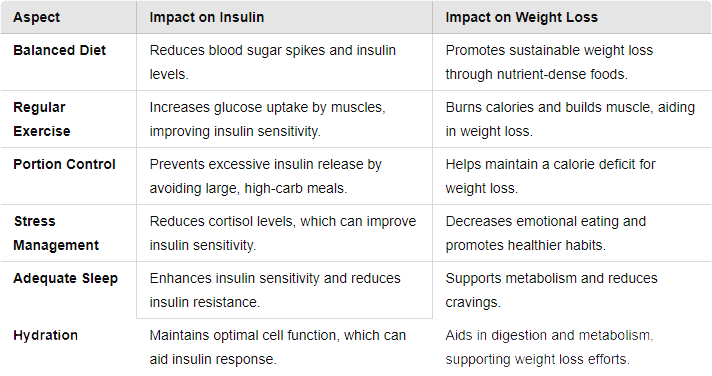Insulin, a hormone produced by the pancreas, plays a critical role in regulating blood sugar levels. It helps cells absorb glucose from the bloodstream for energy or storage. However, when the body becomes resistant to insulin, it can lead to weight gain and difficulty in losing weight. Effective weight loss and lifestyle management can significantly improve insulin sensitivity and overall health. This article explores the relationship between insulin and weight management and offers strategies for improving both through lifestyle changes.
The Role of Insulin in the Body
Insulin is essential for various metabolic processes:
- Glucose Uptake: Insulin allows cells to absorb glucose from the blood, providing energy or storing it as glycogen in the liver and muscles.
- Fat Storage: Insulin promotes fat storage by inhibiting the breakdown of fat cells.
- Protein Synthesis: It aids in the synthesis of proteins, which are crucial for muscle repair and growth.
Insulin Resistance and Weight Gain
Insulin resistance occurs when cells in the muscles, fat, and liver do not respond effectively to insulin. This condition can lead to:
- Elevated Blood Sugar Levels: As glucose remains in the bloodstream, the pancreas produces more insulin to compensate.
- Increased Fat Storage: High insulin levels promote fat storage, particularly around the abdomen.
- Difficulty in Losing Weight: Insulin resistance makes it harder to lose weight despite dietary and exercise efforts.
Weight Loss and Lifestyle Management
Effective weight loss and lifestyle management can enhance insulin sensitivity and overall metabolic health. Here are key strategies:
- Balanced Diet: Focus on whole foods, including fruits, vegetables, lean proteins, whole grains, and healthy fats.
- Regular Exercise: Engage in both aerobic and resistance training exercises to improve insulin sensitivity and promote weight loss.
- Portion Control: Manage portion sizes to avoid overeating and maintain a healthy calorie intake.
- Stress Management: Practice stress-reducing techniques such as meditation, yoga, and deep breathing exercises.
- Adequate Sleep: Ensure 7-9 hours of quality sleep per night to support metabolic health and reduce insulin resistance.
- Hydration: Drink plenty of water to maintain hydration and support metabolic functions.
Benefits of Lifestyle Management for Insulin Sensitivity

Conclusion
Managing insulin levels through weight loss and lifestyle modifications is essential for improving metabolic health and preventing chronic conditions such as type 2 diabetes. By focusing on a balanced diet, regular exercise, portion control, stress management, adequate sleep, and hydration, individuals can enhance their insulin sensitivity and achieve sustainable weight loss. These lifestyle changes not only improve insulin function but also contribute to overall well-being and long-term health.
Call to Action
If you’re looking to improve your insulin sensitivity and achieve a healthier weight, consider adopting these lifestyle strategies. For personalized guidance and support, visit Zenith Diet Clinic to consult with Dietician Priya Mittal and embark on your journey to better health.







